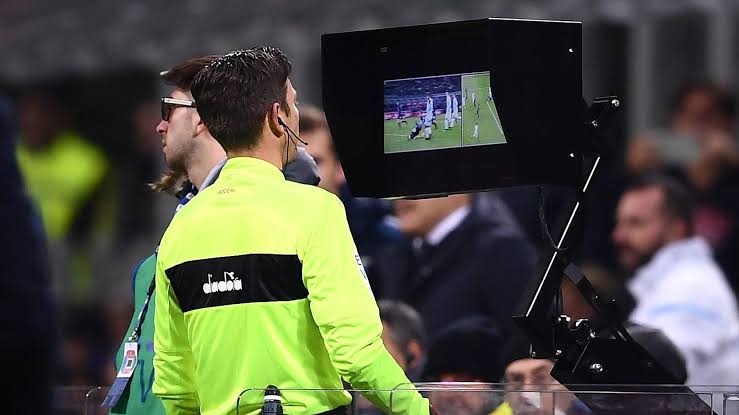Opinion: Has VAR done more harm than good in football?

A referee checking the VAR screen for a possible foul in the penalty box. Photo Credit- The Lazialli
Since its introduction, the Video Assistant Referee (VAR) system has been heralded as a technological advancement aimed at reducing on-field controversies, assisting match officials in making better and faster decisions and ensuring fair play in football. However, it seems a reverse is now the case with recent high-profile incidents, such as the Merseyside Derby between Liverpool and Everton on February 12, 2025, have raised up valid debates, doubts and criticisms amongst football enthusiasts, players and club executives about VAR’s efficacy and its impact on football’s integrity.
The Merseyside Derby VAR Controversy
To begin this piece properly is to take an in-depth look at the recent Merseyside Derby at Goodison Park. Everton secured a dramatic 98th-minute equalizer, leading to a 2-2 draw. The goal’s legitimacy was immediately questioned, with Liverpool players and fans alleging a foul on defender Ibrahima Konate during the goal’s buildup.
Regardless of the protests, VAR upheld the on-field decision, allowing the goal to stand. The Premier League after much criticism from the media later released a statement confirming the VAR check for offside but conspicuously omitted any reference to the potential foul on Konate, further fueling frustration and agitation among Liverpool supporters across the globe.
READ ALSO
Michael Oliver Biggest Controversial Officiating in 2024/25 EPL Season
Between Player’s Passion, Faith and the Premier League LGBTQ+ Campaign
Madrid, City, Bayern: Who Will Survive UCL Knockout Playoffs?
The aftermath of the match was chaotic, with tensions boiling over into a post-match brawl resulting in four instant red cards, including dismissals for Liverpool manager Arne Slot and his assistant. Slot’s frustration was expressively manifested, leading to his ejection and subsequent prohibition from post-match media duties due to Premier League regulations.
VAR’s Inconsistent Application Across Europe
While the Merseyside incident may have spotlighted the gross inefficiency in the adoption of VAR, it is not the first to have occured nor the only event to have shown such controversy. The trend of VAR’s inconsistent application has gone across European football, thereby becoming a source of contention between clubs, players, fans and even between the league’s executives.
In a recent La Liga match between Osasuna and Real Madrid, several controversial decisions were made, including a penalty awarded to Osasuna after VAR intervention and the dismissal of Real Madrid’s Jude Bellingham for alleged disregard of the referee’s judgement. Real Madrid’s coach, Carlo Ancelotti, expressed his fury and annoyance, criticizing VAR for not intervening in what he perceived as clear penalty situations favoring his team.
Similarly, VAR’s controversy has been witnessed multiple times in the Champions League. A match between Manchester City and Real Madrid was marred by an unusually prolonged VAR check on an Erling Haaland goal, causing significant delays and frustration among players and fans.
The Contradiction of Technology in Football
In a bid to resolve the on-field controversies caused by the decisions of referees and enhance fairness and accuracy in football officiating, VAR was introduced and adopted into the sport. However, its implementation has in stark opposition to the reality of it’s invention created more bias and irregularities in the game leading to increased controversy, frustration, agitation, and debate.
The technology’s inconsistent application, coupled with a lack of transparency in decision-making processes, has undermined its credibility. Fans and stakeholders are often left confused and doubtful about the decisions that has been originated using VAR, leading to a growing sentiment that VAR, in its current form, may be causing more harm than good.
Recommendations and Conclusion
While the objective of VAR is to minimize human error and enhance the integrity of football matches, its current application has fallen short of these goals. The recent controversies in the Merseyside Derby and other European fixtures highlight the pressing need for a comprehensive review of VAR protocols.
Furthermore, I do not want to join the train of those who lay accusations and complaints on the inefficiency of VAR. It is not enough to provide negative criticisms on the use of VAR but what solutions are reliable in mitigating the consequences that has erupted from VAR controversies. It is paramount for leagues across Europe to ensure consistency, transparency, and efficient communication in VAR decisions so as to restore trust among players, coaches, club executives and fans.
Asides that, there should be more training sessions on the ways to handle VAR and if possible, these technologies should be upgraded so as to meet up with the current expectations and challenges that comes with the sports. Without such reforms, VAR risks becoming a detriment to the sport it was designed to protect.

